Part One – Poland
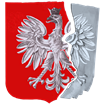
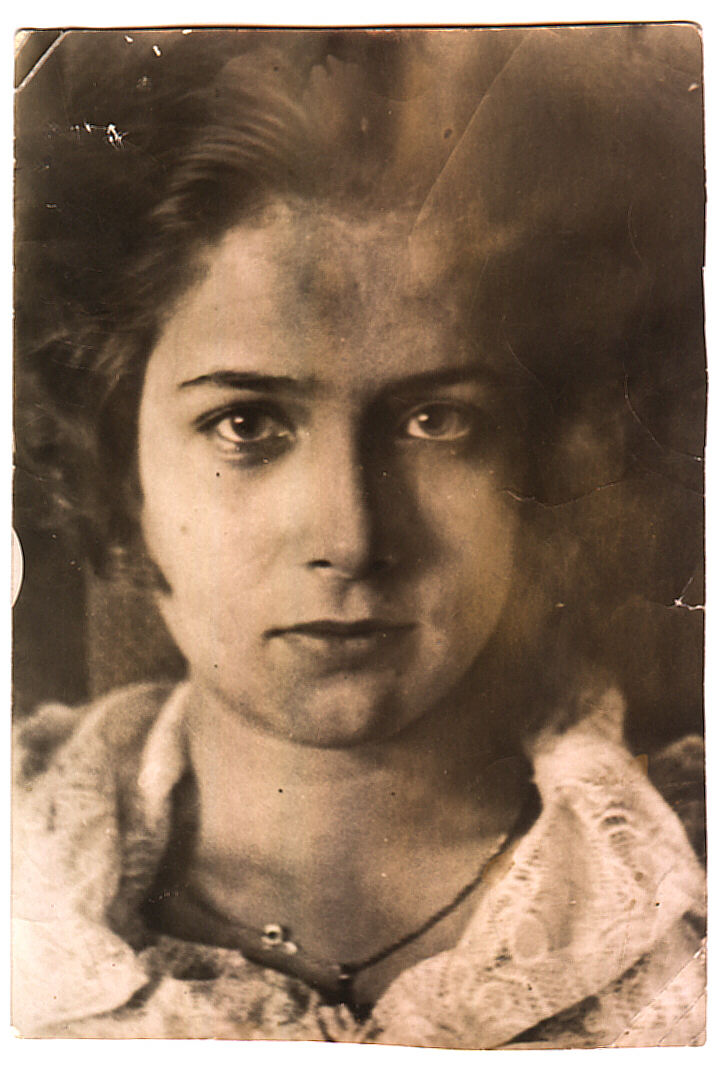
Janina Sulkowska, 1934
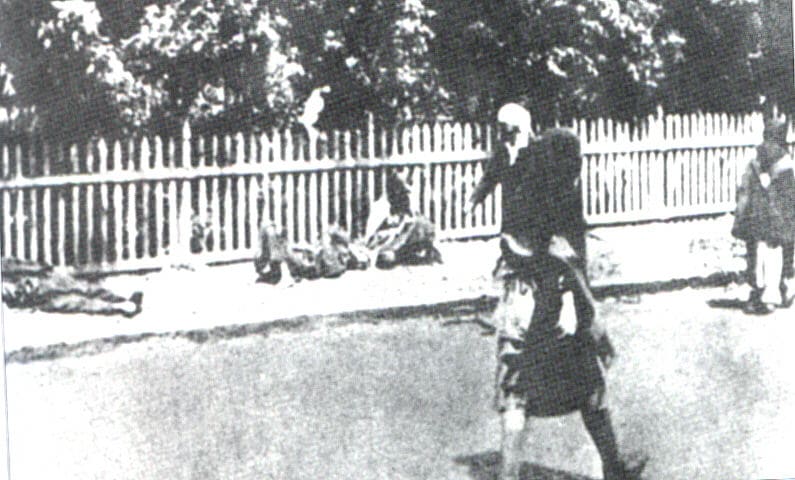
Kharkov 1933: victims of starvation on the streets during Stalin's famine.
A Permanent Cell & Marusia
After two days and nights of brutal treatment I was dragged to my “permanent” cell in the women’s block of Dubno Prison. Though utterly exhausted, I was proud of defying my tormentors and not betraying our cause. Titov had grown hoarse in shouting and I had even outlasted Vinokur! At last I would be allowed to sleep and return to my senses as the NKVD realized that another 24-hours of interrogation could undo my sanity. I would now be allowed to recuperate–but only enough to undergo further questioning. The method of my captors was such that every night’s sleep would be interrupted; prisoners were kept in a state verging on mental and physical collapse. A bright light constantly shone in my cell and any attempt to cover or turn my face from the door resulted in guards beating their keys on the door or the water pipes producing a cacophony. Constant harassment and humiliation were two tools of the NKVD interrogators–starvation, disease and torture were other ones I’d experience.
Next morning, over burnt bread masquerading as “coffee,” I met my solitary cellmate. Marusia had been in prison since October, 1939, and was still wearing summer sandals and a tattered dress. A few years older then me, she had been a factory-worker right here in Dubno. Originally Polish, she had been trapped with her family in the USSR after the Bolshevik takeover. But she and her younger sister managed to escape from Ukraine in 1932 at the height of the “terror-famine” imposed by Stalin. They’d crossed the border, struggling over barbed wire, and at one point were sprayed by machine-guns, which miraculously missed them. Marusia then started a new life in Dubno just a few miles from the Soviet starvation that claimed millions, even as she worked in a huge bacon works that exported to England and elsewhere. But with the Soviet invasion of Poland in 1939 she lost her job, and then her freedom. Marusia was betrayed by a Jewish co-worker, a fervent Communist, who met her on the street and generously offered her work. She eagerly jumped at the chance and followed him–straight into the hands of the NKVD where he denounced her as an escapee from the USSR, a serious crime as she was still considered a Soviet citizen. How many co-workers and friends had he betrayed, and how many more would he still send to hell? I soon discovered that most of the positions in the prison and security systems were given to the dregs of Jewish and Ukrainian society.
Marusia and I spent almost two months together, sharing our sorrows and life-stories. I described to her my university days and the night-life of Warsaw; she told me horrific stories of life in the Ukraine under Soviet collectivization and the wars against the Ukrainian people. She would shake in rage as she described people being forced to eat grass and bark, and in some cases their own children, while soldiers guarded warehouses full of grain and food requisitioned from the victims themselves. Emaciated corpses littered the streets of villages and towns. Millions who resisted were shot as kulaks or shipped off to camps. And this was still going on. Poor Marusia had lost most of her family in this way, and I tried to console her as best I could; and she was a tower of strength for me during this period when I was a victim of constant interrogation.
On May 15, 1940, Marusia was taken from our cell without explanation. I gave her a pair of nylons and some rags for she had nothing. Just before the door shut, we exchanged a final look, admitting that as a Soviet citizen she would never be allowed to leave alive. I would spend the next two months completely alone in this cell. That night I thought about the great monster that the Soviet system was: how it consumed millions of people and still craved more. And I had no idea that I was heading into the belly of this insatiable beast….
Endless Interrogations
I spent many nights on a stool beneath a glaring light, at the mercy of an assortment of vicious NKVD interrogators. They were mostly uneducated thugs, impatient, violent, and particularly ignorant about Poland. I heard a story typical of this type of cham [boor], who, when questioned by a victim about the Soviet Constitution, grabbed a bar and beat him about the head screaming, “Here’s your constitution!” But their brutality and ignorance was matched by their loyalty, and under Vinokur’s short leash, they proved invaluable. Vinokur’s secretary and second-in-command was Bronstein while the administrative head was Rachil Geifler, both of them Soviet Jewesses. With Vinokur they would lead the mass panic-murder of prisoners in 1941.
The total number of interrogation sessions that I underwent was close to forty and usually at night. The majority were in the first half of my year-long stay in the Dubno jail from March, 1940 to March 1941. The direct and drastic methods employed in attempting to extract information from me included electric shocks, being kept in a high chair above the ground which pain in my legs, and a game of Russian roulette as only Vinokur could play. And yet what I was to experience later in the labour-camps was such that I almost looked back on Dubno Prison as my “golden days.”
On my fourth or fifth day I was called in by Captain Titov, pacing in an excited state and barely able to contain his glee. “We’ve caught the bird!” he shouted and described how he and his boys set a trap at the Trautman’s for that greatest “swolocz” [bastard] of our group. “This Potapow will sing like a bird!” Titov promised while I recoiled in horror.
I had assumed Zygmunt Rumel was his prey–but it turned out to be Jurek Bronikowski alias Potapow. It was I who had advised him to flee my house and go to the Trautmans–and straight into Titov’s trap. Because of me, poor Jurek would soon find himself in a cell above me…in the section for those sentenced to death.
After Marusia was taken away I bore the brunt of my interrogations in solitary. The investigation shifted to things seized at the time of my arrest. I had destroyed the encoded document with membership details after my father’s arrest, while my Constitution of the USSR, containing details in pinprick, had been thrown aside. And the leaflets hidden in my soap had been burned by my brother. But the NKVD smelled a plot in each item and with every denial.
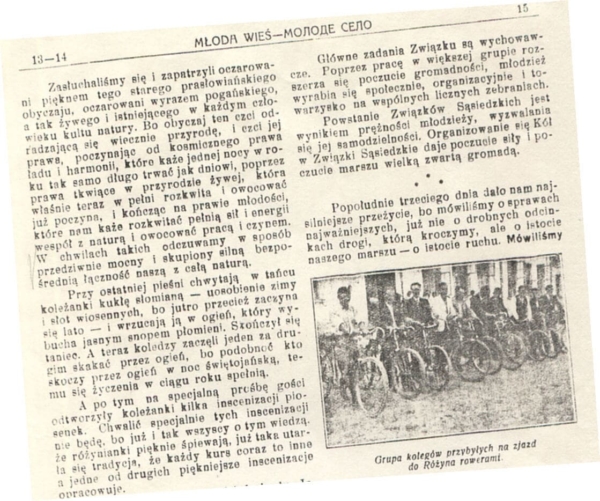
Mloda Wies with Janka’s article
My confiscated magazine Mloda Wies greatly angered Vinokur and Titov as it extolled Polish-Ukrainian friendship, and had a photo of Pilsudski and Petlura entering Kiev in 1920 during the Polish-Bolshevik War in which Poles and Ukrainians fought the Red Army.
“So the accursed Poles dream of ripping Ukraine from Russia!” Vinokur screamed at me.
I explained that I didn’t even read it–even though I published an article in it about Polish-Ukrainian brotherhood which they didn’t know about. To them this magazine was proof of an anti-Soviet plot, and would later help convict me of belonging to a “Polish-Ukrainian revolutionary organization.”
Two nights were devoted to names in my Warsaw address book–many of whom I explained were dead now. Vinokur asked me about life in Warsaw, a once-vibrant city now under brutal Nazi occupation. Unable to contain myself, I asked the Major if he was planning to visit “Varschua.” A strange smile passed across his face, and tilting his head so as to accent his Semitic features, he replied that unfortunately his face was a real “apparition,” and he was not planning a trip to Warsaw–at least not in the near future. His humor sent a chill through me. I knew a little of what was happening to Jews under the Nazis to understand the reference (the Warsaw Ghetto was just being sealed). I thought to myself such are the times of the Nazi-Soviet Pact when the lives of millions of people are mere trifles to be joked about.
Suddenly Vinokur rose from his desk and retrieved a tin box from the cabinet. His back was to me, but I observed him assembling a syringe and bottle–and then injecting himself in the forearm. Later I learned from other prisoners that this powerful NKVD official was a drug addict. Did the drugs dull his emotions or heighten them when he tortured and murdered?
A Package from Home
In April I was summoned for a rare daytime encounter with Titov who expressed “concern” over my dirty clothing which had never been washed. He presented me with a pen and paper.
“Write a letter to your beloved mother for some clothes,” he explained like a concerned teacher.
I was ecstatic, not having any contact with my family who probably didn’t know if I was alive or dead. The NKVD delighted in keeping prisoners and families in a state of limbo. It was common for relatives to line up for weeks or months at a prison unsure if their loved ones were really there. Some would never find out. I wrote the letter with trembling hands.
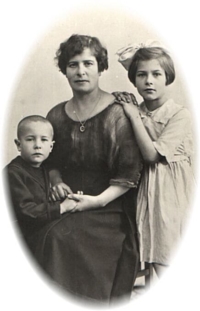
Natalia Sulkowska with Czeslaw and Janka
In three days my package arrived. What joy! Clothing, towels, underwear, socks as well as cake, butter and slonina [pork fat]–my secret indulgence! The food had been sliced by guards looking for contraband, but tasted just as sweet. This was the last contact with my family for years. I found out eight months later that the day after my mother delivered it to Dubno (she wept all night standing at the gate) my family was arrested and deported to Kazakhstan. That bastard Titov knew of the impending transports, but said nothing to me.
A day later I thanked Titov for my mother’s package. He ran off in a cloud of
perfume and talcum, and returned muttering that Nachalnik Vinokur had indeed taken the package from Natalia Sulkowska–and then let her go. It seems that my mother had gone directly to Dubno Prison and had not reported at NKVD headquarters where Titov would have been notified. He had often grilled me about the fictional Mrs Dolska, and I now realized I’d endangered my mother with this fabrication. Through my letter he hoped to get my mother to come to Dubno (before she was shipped off) where he could confront her about Mrs Dolska. Suddenly my precious pork fat turned a bit rancid. Titov was so furious at his missed chance that he began snapping a leather belt in my face.
Christopher Jacek Gladun was born in 1951 and grew up in Canada to where his family emigrated from England as displaced persons. Sadly, Chris died in Toronto in March 2003. He held a diploma in Journalism from the Niagara College and a BA in Polish Language & Literature from the University of Toronto. Chris also acted as interviewer and researcher for the documentary film “Rescued From Death in Siberia”.
This content is now maintained by the Kresy-Siberia Group, which Chris was a charter member of and which is taking his website and his research work forward.